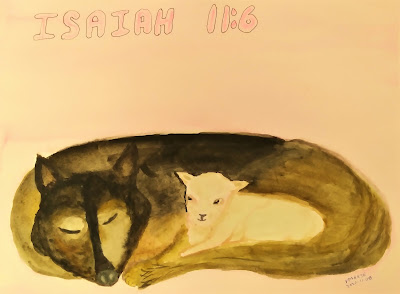2nd SUNDAY OF ADVENT – Year A
December 4, 2022
Today's readings from Isaiah and from the Gospel of Matthew may seem wishful thinking and hard to reconcile with the here and now of current events. It may seem that with the wars in the Ukraine and Middle East, the triple threats of the flu, covid-19 and RSV, the climate crisis, that God has taken a holiday. How do we reconcile the evil and suffering the world is suffering now with the peace, justice and goodness of the kingdom of heaven, which for Matthew means the Kingdom of God.
It all seems too much if we think of the Kingdom of Heaven as some future place. Matthew uses Heaven in the Jewish tradition of not naming God directly. For Matthew the Kingdom of Heaven is the Kingdom of God, which is “at hand” or “near.” At this time of year, we sing of Emmanuel, which means God is with us─ even in the face of sin and evil ─God is present not only as Creator and Life-Giver, but with us as the energetic pull to the Good.
In the second reading Paul tells us to “think in harmony with one another” and to “welcome one another.” That also means trying to understand those who do evil or cause suffering without succumbing to or participating in it and without demonizing them as persons. The Hindi and Sanskrit phrase, Namaste, which is usually spoken with a slight bow means, "I bow to the divine in you", conveys the intentional attitude we should have towards one another.
The gospel writer says, “And do not presume to say to yourselves, ‘We have Abraham as our father.’ For I tell you, God can raise up children to Abraham from these stones.” He is talking to those who think they are saved because they consider themselves righteous, without giving a thought to justice. Yet there is no righteousness without justice. Likewise, Matthew is reminding us that our deeds are outward signs of our inner state. In other words, take care lest we become people who think God is on our side—but not theirs. Rather, we are to take note that God is on the side of righteousness, that is, justice. Our deeds either prove or belie our words; as is rightly said, faith is a verb. Our faith, therefore, should call us to work for justice rather than demonize the unjust. The struggle at Wet’suwet’en is an example of what I'm talking about. Right now, even if they lose this particular battle, they have won because they have won hearts nationally and internationally.
By nature, we are designed to be co-creators, co-agents, co-lovers with God. When we fall short, God’s open invitation is always there waiting for us to reaffirm and resume enacting our “yes.” The punishment of which the first reading and the gospel refer is what befalls those who reject God's invitation. Think of it like this. Imagine, you are part of a functional and loving family, who gets together at Christmas, Thanksgiving, or family reunion. But because of your own actions of putting other concerns ahead of your family, you refuse to participate or attend these occasions. You alienate yourself and are filled with remorse. But your parents and the rest of your family don't give up on you. Imagine, how you'd feel when their all gone. That is what hell really is, saying “no” to God's invitation so often that it becomes an unbreakable habit that brings you nothing but remorse. It's becoming so blind that you forget that with God, you are always welcome. But it is up to you to show up. When we show up and act as members of God’s family of love, we are another step closer to building the peace on Earth that God intends.
Please share your thoughts.




Comments